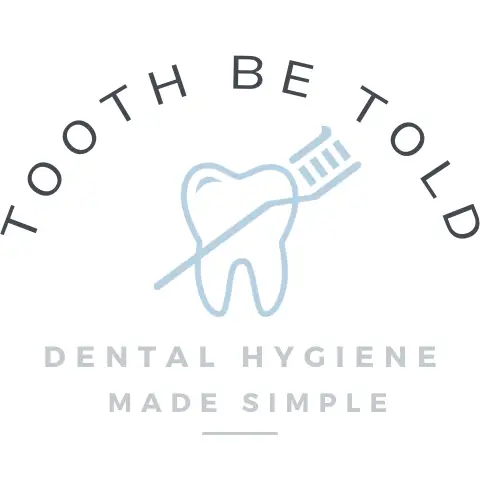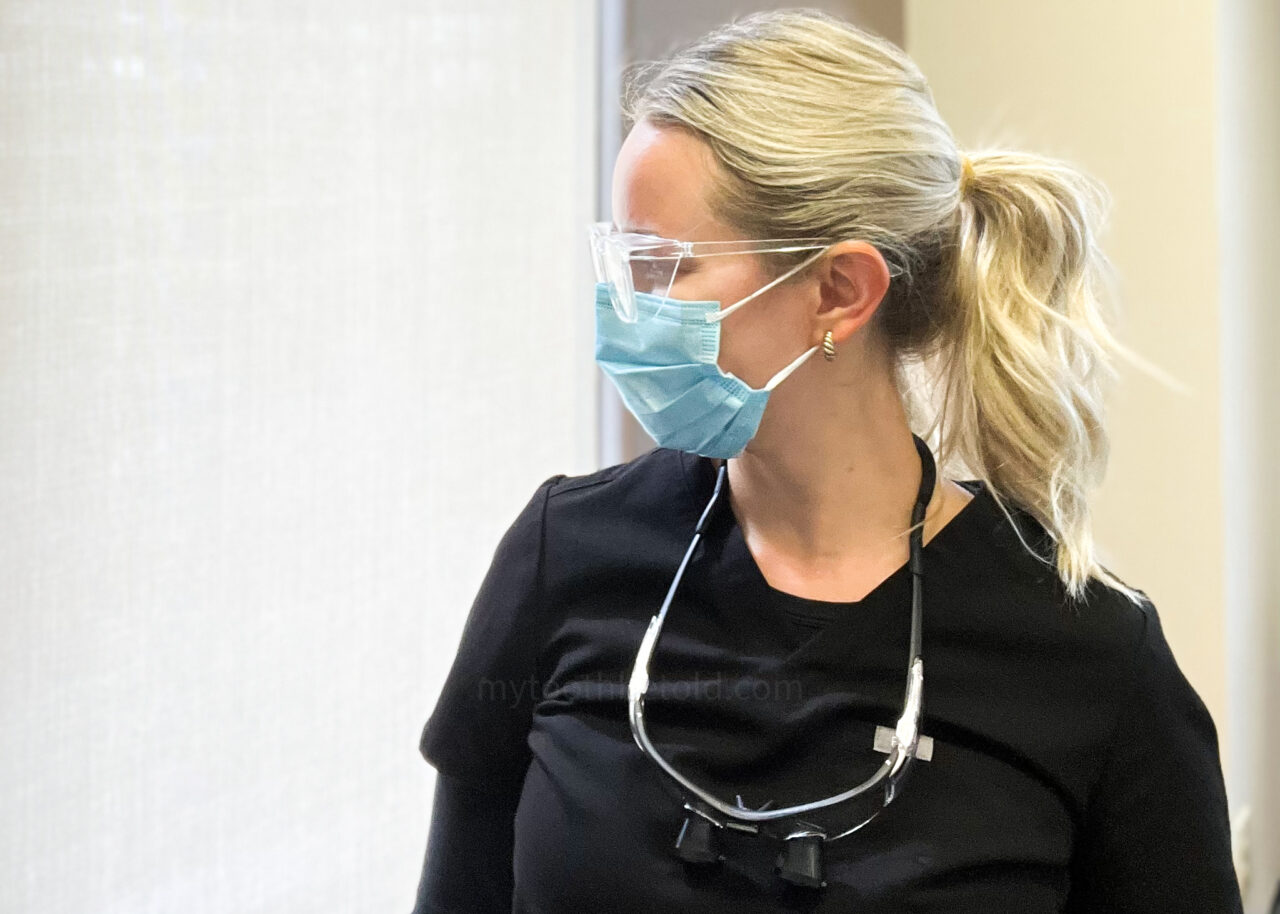
Burnout can happen in any job, but healthcare professionals see a higher rate of burnout over other professions, especially since 2020! I suffered from burnout pretty severely at the end of 2022, and this post is about preventing burnout, including my personal experiences.
Everyone’s stressors can be different, so the best thing to do is to identify yours and tackle them. In my experience and talking with fellow dental hygienists who have been practising for over 30 years, below are the 17 best ways to prevent burnout!
1. Condence working days
I limited the days I work in a week to three days. When I started as a hygienist, I worked five days a week and began to have carpel tunnel symptoms and other burnout symptoms. I also worked in an office with a toxic environment, which made me resentful and unhappy where I was working.
Luckily I had an opportunity, and I took it and went down to working three days a week at a different dental office. While working there, I took extra shifts and fluctuated between working 3-5 days. But I always had the opportunity to say no if I found it was too much.
Another benefit of working fewer days a week is that your body has time to recover physically from the job, and your mind also has full days to recover.
When I return to work after a long weekend, I feel rested, mentally more stable, and energized to give my patients 110%.
Working three days a week allows me to be the best practitioner to my patients.
Holly Verran RDH
It may not be easy to find a dental office that will allow you to work less, depending on their hours of operation. But the average dental office is open 4 to 4.5 days a week and may be able to accommodate your request for working a select number of days.
Especially in this era, as dental hygienists are hard to come by, employers are willing to accommodate hygienists to hire them!
Another option to limit working days is to work as a temp hygienist. Working as a temp allows you to choose your office, control the number of days you work, and have various people to work with.
There are many causes of burnout, and below is a link to a post I wrote about the causes of burnout in dental hygienists.
Read Now: Dental Hygienist Burnout; Causes, Prevention, Burnout Rate
2. Limit the number of demanding patients per day
Some patients require more energy and mental stamina to work with. It is like all jobs dealing with the public. Some patients require more from us hygienists than other patients.
It is not a bad thing; it is just reality.
For me, the new patient exam and meeting my patients for the first time are the most demanding. I go so in-depth, ask many questions and explain how I practice, and really work with the patient to understand their oral health goals, complete a full assessment, and discuss the finding with my patient.
Below is a link to a post I wrote about what happens in a dental hygiene appointment, so you can understand how I structure my appointments.
Read Now: How Dental Hygienists Clean Teeth What You Need to Know!
There have been a few instances where I have seen multiple new patients in a day, and I find it just too much, and it led me to become burned out at the end of 2022.
So I had a discussion with the front desk, and we worked together to come up with the best plan of action, and now I have a limit of one new patient a day.
The same goes for seeing people who require certain positions in the dental chair. For patients who cannot lay all the way back, it seriously takes a toll on our bodies. So again, I try to limit how many of these patients I see in a day.
I keep an eye on the schedule and work with the front desk to make these accommodations. I am so lucky that I have such an incredible team to work with, and we have mutual respect for each other and care about our well-being.
It is why I have stayed working at the same office since 2016.
3. Increase dental appointment time
I generally book an hour for every patient, even for some kids. And if I know I have a lot to do in an appointment, I will book more than an hour.
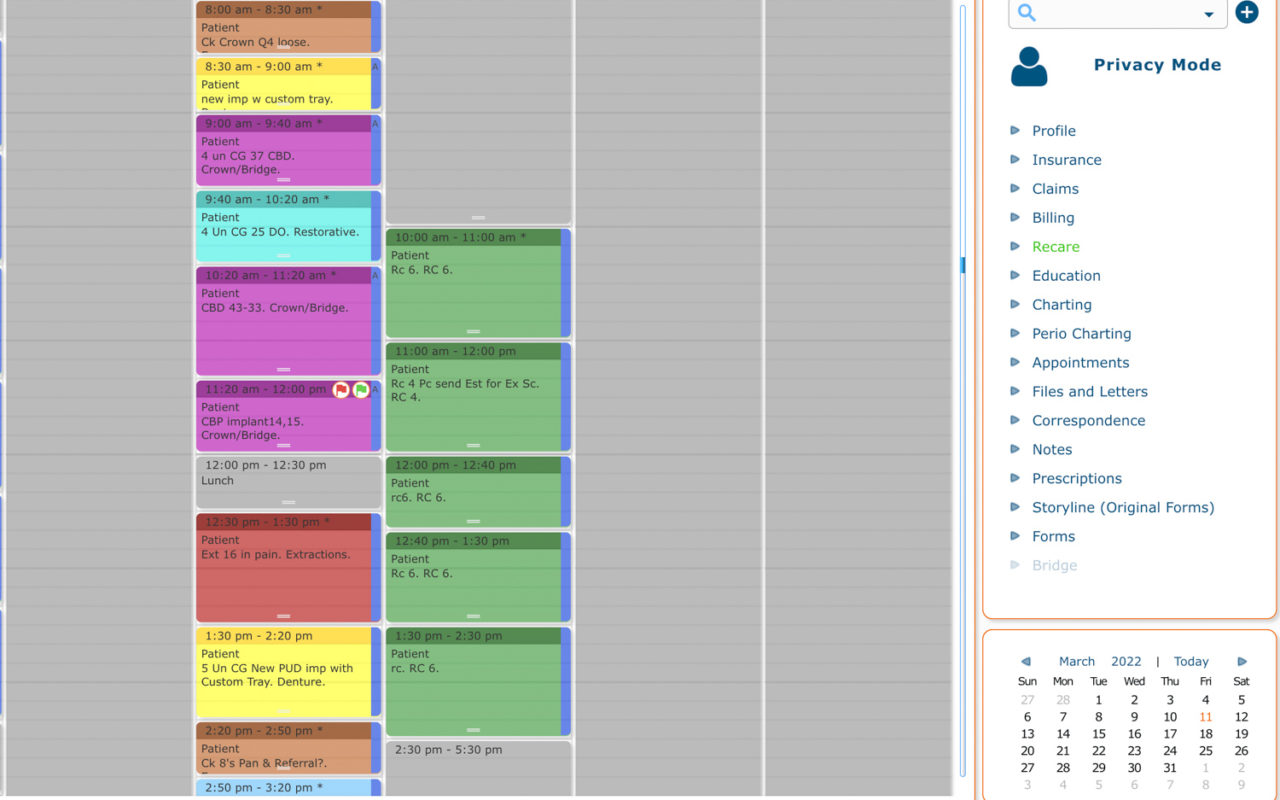
I also try to book at least 1.5 hours to 2 hours for new patients. I do not like being rushed as it lowers the quality of care I can provide. I also ensure every adult is booked for at least one hour (sometimes more if the patient requires more time). And I even like to have lots of time for kid appointments, so I have time to talk with their parents or guardian.
Don’t be afraid to ask for more time. If you get pushback, you need to say that the patient’s care is the utmost priority, and you cannot give them what they deserve in such little time. The patient’s health and care are the most important, not the amount you bill out or how many patients you can squeeze into the day.
Be kind but firm!
Consider this; if you work for an office that is more about getting in as many patients as possible and squeezing appointment times, every time a patient is booked, the room needs to be set up and torn down, taking away precious “billing” time during the day.
Just because you see more people in a day does not mean you can bill more.
If you need an hour for a patient, but their appointment is only booked for 40 minutes, you still need to bring that patient back to complete their treatment.
Suppose their treatment is spread over two appointments. In that case, the amount of set up and tear down of the room is possible billing time, so you really don’t end up profiting that much more, and you’ve annoyed your patient because they have to come back twice, interrupting their daily schedule.
It is unfair to the patient to condense their treatment time because thorough care cannot be taken. It also takes time to build rapport with the patients, making your relationship grow, increasing trust and, most importantly, giving them 110% effort.
Building rapport and increasing patient satisfaction are critical to a successful practice and treatment.
When we feel rushed, it can play on our psyche and lead to burnout. Also, the patient can ALWAYS tell if you are rushing and not giving them your best.
4. Talk with your loved ones about burnout
Open communication about burnout and how you feel with your loved ones is essential.
I need people around me to know my limitations and how I feel. I do not like bottling up how I feel because it can lead to more stress, anxiety and reduced self-love.
I communicate with my husband about how I feel about work and the need to limit social activities outside work. He also knows that sometimes I need “Holly time” (that’s his name for it 😆), and I need alone time.
If I am feeling the symptoms of burnout, I tell the people around me that I need to take care of myself and have “Holly time,” and they understand it has nothing to do with anything they did. It is an extremely healthy practice to set these types of boundaries.
For me, this looks like self-care and reducing energy-taxing activities outside work.
Give me an audiobook, a coffee shop, and a walk outside in the sunshine; it instantly makes me feel better. But these things are only one piece of the puzzle to preventing burnout!
Even though burnout can make us question our career choices, it is essential to remember the great parts of being a dental hygienist!
Read Now: Good Jobs: Why Being a Dental Hygienist Is Worth It!
5. Reduce social obligations outside of work
I think socializing too much is one of my most significant causes of burnout. I always have to sociably “be on” at work. My mind needs to calm down and be silent, and I use meditation and mindfulness to help with this.
Some people are energized through socializing, but I am the opposite. I think because dental hygiene is such a socially demanding profession, having to deal with all people from all walks of life with polarizing views and personalities.
I feel like I get my social quota at work, so I do not need much extra socializing outside of work.
I am grateful for my friends who understand and like to do low-key things and make hanging out easy and enjoyable.
I limit myself to 1-2 social activities a week, and if I add more, I tend to start feeling run down and behind on my other essential tasks.
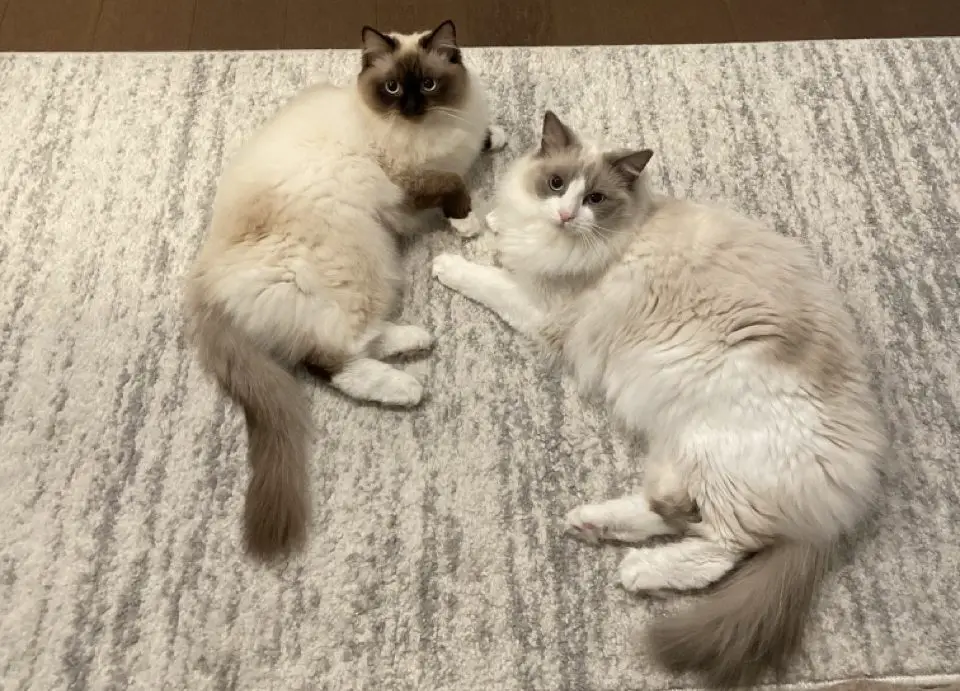
6. Discuss with your doctor and therapist
I also spoke to a therapist for a while and established a few things about my personality, my energy to do specific tasks, how to manage stress and anxiety and work through my problems. I also learned how to ask for help more, as I never wanted to burden anyone.
I learned that I do not want to burden other people, so I take a lot of tasks on myself without asking for help. I knew I needed to focus on being okay with asking for help.
I also take medication to ease my anxiety, and the people I work with know I experience panic attacks and bursts of anxiety.
Having anxiety and panic attacks can make you feel alone, and you're the only one going through it. But in reality, so many people experience these feelings and physical symptoms. Our mind can be our own worst enemy.
Medication is not for everyone, but it is there if needed, and this can be established between you and your medical doctor and therapist.
7. Set boundaries; tell your coworkers what’s up
Setting healthy boundaries can be the key to preventing burnout.
I used to be a “yes” to everything person. A new patient needed to be squeezed into my schedule? Yes! A patient can only come at a specific time; can you stay late? Yes! Can you work an extra day this week? Yes!
Yes, yes, yes, I said. Then my body said no, no, no!
Overworking made my body more rundown, left a smaller amount of time for me to do the things that energize and refuel my battery, and led to my eventual burnout.
Saying yes also made me feel less in control, and I started to feel like I couldn't escape.
I discussed with the front desk staff that I could not work into my lunch, stay late, or shorten appointments. This may sound harsh when reading as the tone is not transparent, but I come at it from a loving place. If I burn out and become overworked, I cannot show up and provide my patients with the 110% effort I want to give them.
Longevity is important!
The bottom line is to tell your coworkers how you are feeling. People don’t know what is happening inside our heads, and having healthy conversations about our feelings can make all the difference in the progression of burnout.
8. Ask your coworkers for help
As I mentioned, asking your coworkers for help is okay.
Be honest and kind and politely tell them you are feeling overwhelmed and ask if it is okay if they can help you.
For example, if I ran late with a patient, I never asked for help with cleaning up and other tasks. But I work with a fantastic team, and the dental assistants are so helpful they made me feel more at ease asking them for help. Often, they will come and take my dental tray after I am done with an appointment.
It is all about teamwork that makes the office run well. When I have an opening or free time, I will help them with laundering treatment gowns and sterilization.
9. Take continuing education that sparks your passion
Learning about something in the dental hygiene profession ignites my passion for the career. It makes me feel more connected to the profession and reminds me that what I am doing for my patients is life-changing.
We have the opportunity to change people’s lives and improve their health!
I love learning and keeping up with my education, and it also connects me with other hygienists.
Take a course on the importance of taking blood pressure at appointments or brush up on periodontal disease and its correlation to systemic health.
10. Learn about yourself and what your triggers are
I have learned that overworking impedes my ability to be a great hygienist.
I work with the front desk on scheduling and tell them what I feel comfortable doing. I also don’t say no to accommodating, but we work together to figure something out that doesn’t leave me at risk for burnout.
Everyone’s triggers are different, and being more mindful about patterns or certain things that make you feel burned out is important.
11. Book personal days off that are for you only
Book a day off here and there to focus on yourself. Spend the day doing things that make you feel better.
It could even be catching up on laundry, reading a book, or going for a massage. I try to take days off that are not all about going on vacation, but maybe that works for you!
The key is to do something that you love or that will make you feel better.
I love heading to the local outdoor spa, taking in the sights, and having some time away from reality.
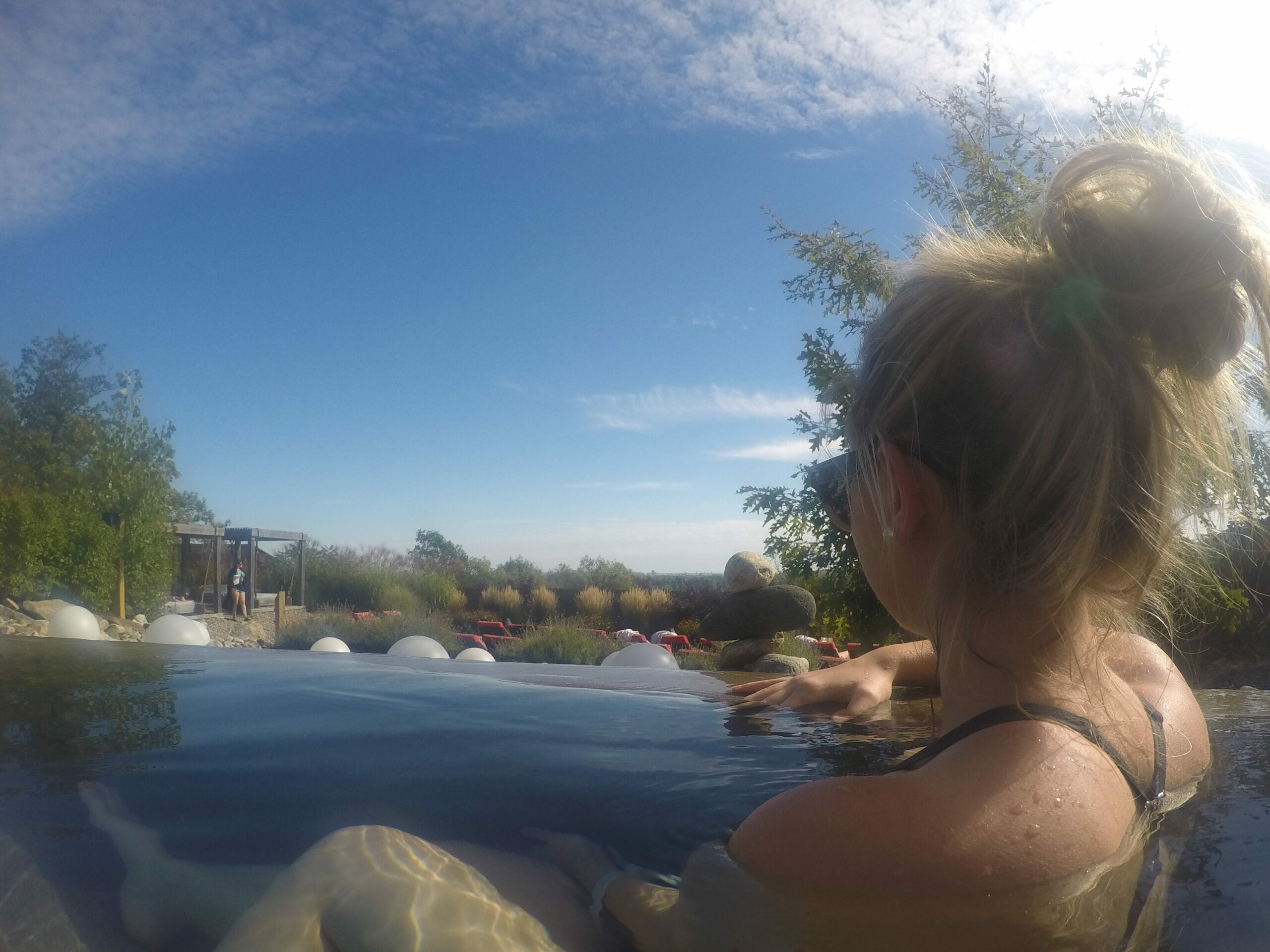
12. Improve time management
Falling behind on the schedule and running late can increase stress.
If the patient needs radiographs and periodontal charting, look ahead, plan ahead, and book more time.
I break the appointment into segments and watch the clock to ensure I am running on time. Although sometimes patients can be super chatty, this can have challenges.
We also don’t need to be a hero. A veteran dental hygienist told me multiple times. She said, “Holly, you don’t need to do everything all in one appointment; you don’t need to be the hero.”
This can sound harsh, but It was from a place of love, and she could see the signs that I was beginning to burn out.
This advice helped me so much.
Don’t feel bad if you can’t do everything in one appointment. I spread out radiographs and periodontal charting to not overwhelm both the patient and myself. And sometimes, I forego the polish and wait until the next appointment.
You can tell the patient that you cannot finish everything in one appointment. This mostly happens when the patient has not kept up with regular hygiene appointments and is overdue. In this case, I try to catch it before they come in so we can increase their appointment time so I will have time to complete the treatment.
If the patient is overdue, I always start the appointment by letting them know that because it has been a certain amount of time since their last appointment, I may not be able to get everything done in one appointment. Being honest with your patients is very important and will build trust and respect.
Dental hygiene treatment cannot be rushed and is integral to their overall health.
13. Schedule a longer lunch
Scheduling a longer lunch allows your body to rest and gives you enough time to get outside for some fresh air. Walking for 15 minutes in silence can help you!

On one of my work days, I do not take lunch so that I can leave earlier. However, even though it is my shortest day, it is my most stressful one because I do not have the chance to sit down, rest, breathe and reset during the day.
14. Meditate before or after work
Meditation can seem like a chore, but it can help reset the mind. Guided meditation is my jam, and I find that my body craves it.
It can make a massive difference for as little as 10 minutes today. You can set up the apple watch mindfulness prompt if you have an apple watch, or you can set a reminder on your phone to sit down and take a break.
I do guided sleep meditation and sleep stories. Somehow, they are like magic. My medical doctor told me about Blue Gold, narrated by Stephan Fry. I will link the YouTube app below. For some reason, I need to go to the lavender fields of Provence, France.
I also love Jason Stephenson on YouTube. His YouTube channel is linked here. I swear my mind melts and calms instantly when I listen to his videos and audio.
15. Stay hydrated; plan to drink 2 litres at least a day
I have a water container with a straw that is easy to drink from.
I like having a large water bottle to plan my daily water intake. I try to drink 1 litre before lunch and 1 litre after.
It makes me feel better and allows my mind to stay alert.
16. Focus on good quality sleep
I suffer from insomnia and have trouble falling asleep and staying asleep.
I was on medication for sleep for a while, but it started to not agree with me, so I stopped.
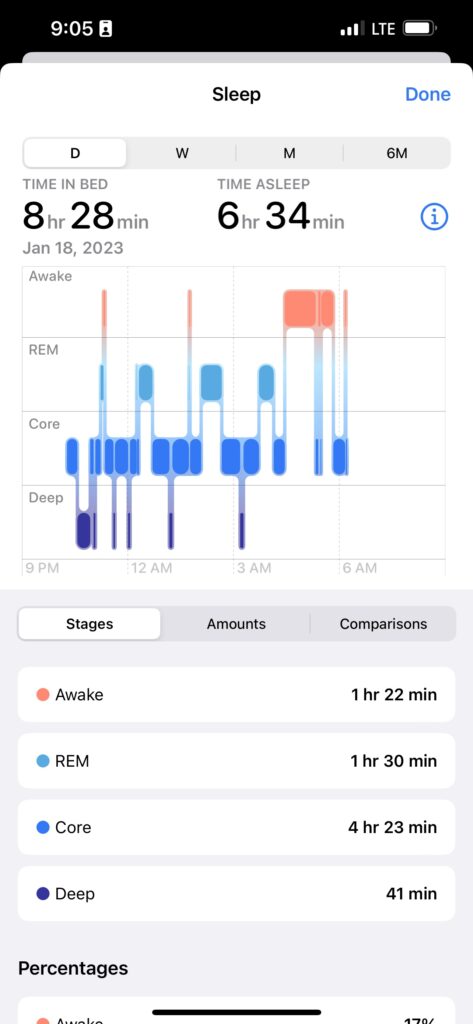
Talking to my therapist and doctors, I created a “sleep hygiene” protocol and a nighttime routine to let my body know it was time to shut down and prepare for sleep.
Focusing on good sleep with help your body and mind recover and reduce burnout.
I used to stay up late, but now I have a set reminder on my phone and apple watch to remind me to start to unwind and go to bed.
17. Excercise to strengthen the upper body and core
We dental hygienists are always leaning, bending, and performing repetitive motions!
It is such a physically demanding profession.
I know when I am not strength training and working out regularly, my body is not as strong, and I fatigue more quickly.
My neck, shoulders and back can become sore, and the chronic pain starts to creep back up. So strengthening these parts of your body is important for the longevity of your career and preventing burnout.
Working out regularly keeps my mind strong and reduces mental fatigue, stress and anxiety.
If you are experiencing burnout symptoms, I hope you can find what works for you and reduce the chance of fully burning out.
All the best,
Holly 🙂
